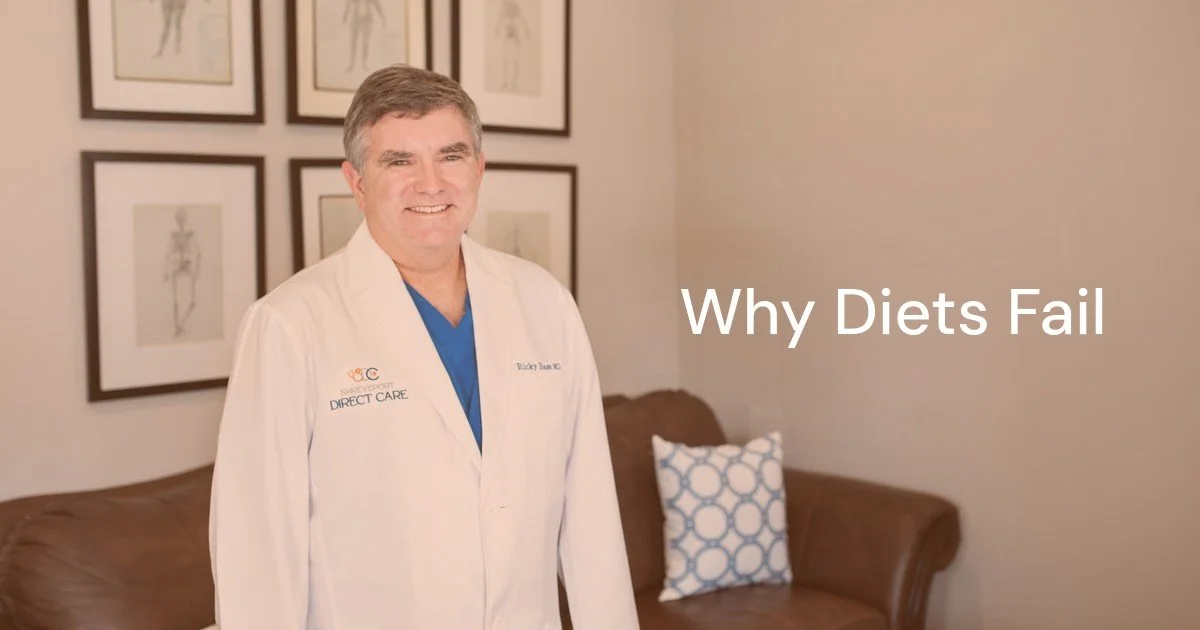Why Diets Fail — and What Works Instead in Shreveport
Do you know why your diet is failing?
If you’ve ever tried to lose weight, you probably know how it feels: at first you’re motivated, you see a few pounds drop… and then the weight comes right back. Maybe you’ve tried keto, low-carb, low-fat, intermittent fasting, or calorie counting — but nothing seems to stick.
The truth is simple: most diets fail not because people lack willpower, but because the diet itself is broken. At Shreveport Direct Care, we help patients understand why that happens and how to create real, lasting results — without starving or stressing over every bite.
🧠 1. Diets Focus on Short-Term Results, Not Long-Term Health
Most commercial diets are designed to create fast results. They restrict calories, cut out food groups, or rely on products that can’t be maintained in real life.
At first, your body loses water and glycogen (stored energy). But as your body senses fewer calories, your metabolism slows down — a natural survival mechanism. Once you return to normal eating, you gain the weight back quickly — often more than before.
This is called “metabolic adaptation” or “yo-yo dieting,” and it’s one of the main reasons people struggle to keep weight off.
“The body fights weight loss with powerful biological mechanisms that favor weight regain.” — Hall et al., The New England Journal of Medicine, 2016.
⚖️ 2. Willpower Can’t Beat Hormones
You can’t out-willpower your biology. Hormones like insulin, ghrelin, and leptin play huge roles in hunger, fullness, and fat storage.
Insulin controls how your body stores fat and uses energy. When insulin levels stay high (from frequent snacking or high-carb diets), fat loss becomes harder.
Leptin is the “I’m full” hormone — but after repeated dieting, the brain becomes less sensitive to it.
Ghrelin is the hunger hormone — and it increases when you restrict calories too much.
When these systems get out of balance, your brain tells your body to eat more, even if you don’t need more energy.
“Weight regulation involves complex hormonal and neurological feedback loops that resist long-term weight loss.” — Rosenbaum et al., Obesity Reviews, 2010.
🍗 3. Diet Quality Matters More Than Calories Alone
While calories matter, the type of food you eat matters more. A 500-calorie meal of processed food is not the same as a 500-calorie meal of lean protein, fiber, and vegetables.
High-quality foods (especially protein and fiber) improve satiety, stabilize blood sugar, and protect muscle mass — helping you lose fat, not just weight.
At Shreveport Direct Care, we encourage:
More whole foods (lean meats, fish, eggs, beans, nuts, fruits, vegetables)
Less processed food (packaged snacks, sweetened drinks, fast food)
Adequate protein (at least 25–30 grams per meal for most adults)
“Diet quality — particularly higher protein and fiber — improves adherence and promotes fat loss.” — Gardner et al., JAMA, 2018.
💤 4. Sleep, Stress, and Movement Are the Hidden Keys
Most people underestimate how much sleep and stress affect their weight.
Poor sleep increases hunger hormones and cravings for sugar.
Chronic stress raises cortisol, which drives fat storage around the belly.
Inactivity lowers metabolism and muscle mass — both key for maintaining weight loss.
Simple changes like walking after dinner, turning off screens before bed, and taking time to de-stress can improve results dramatically.
“Short sleep duration is associated with increased obesity risk through hormonal and behavioral pathways.” — Taheri et al., PLoS Medicine, 2004.
💬 5. Accountability and Medical Support Make All the Difference
This is where most people fail — they try to go it alone. Even with the right information, changing habits is hard. Having a doctor who knows your history, checks your progress, and helps adjust your plan makes success much more likely.
At Shreveport Direct Care, weight loss isn’t a one-time visit. It’s ongoing, personalized care with:
Regular follow-ups
Affordable medications when appropriate (like GLP-1s or metformin)
Coaching on nutrition, sleep, and movement
Direct access to your doctor by phone, text, or email
When patients have someone in their corner, they don’t just lose weight — they keep it off.
“Long-term behavioral support significantly improves weight maintenance.” — Wing & Phelan, American Journal of Clinical Nutrition, 2005.
🌟 What Works Instead: The Shreveport Direct Care Approach
Here’s what we’ve learned works best for lasting success for medical weight loss in Shreveport:
Start with the basics: Sleep, hydration, and movement.
Eat real food: More protein, plants, and fewer processed carbs.
Be consistent, not perfect: Small daily habits beat strict diets.
Address root causes: Hormones, medications, thyroid, sleep apnea, etc.
Stay connected: Frequent follow-up and encouragement keep you accountable.
The key isn’t another diet. It’s a lifestyle — one that’s realistic, enjoyable, and sustainable.
🏥 How Shreveport Direct Care Can Help
At Shreveport Direct Care, we offer doctor-supervised weight loss as part of your monthly membership — with:
Unlimited visits (in-person or virtual)
Free access to your doctor
Affordable medications and labs
Guidance tailored to your unique goals
Whether you’re trying to lose 10 pounds or 100, we’ll help you create a plan that works for your life — not against it.
📞 Call (318) 588-7060 or visit www.shreveportdirectcare.com to schedule your free meet & greet and start your journey today.
References
Hall KD, et al. New England Journal of Medicine. “The Biology of Weight Loss Maintenance,” 2016.
Rosenbaum M, Leibel RL. Obesity Reviews. “Role of Leptin and Hormonal Regulation in Weight Maintenance,” 2010.
Gardner CD, et al. JAMA. “Effect of Low-Fat vs. Low-Carbohydrate Diet on Weight Loss and Metabolic Factors,” 2018.
Taheri S, et al. PLoS Medicine. “Short Sleep Duration and Obesity: Hormonal and Behavioral Mechanisms,” 2004.
Wing RR, Phelan S. Am J Clin Nutr. “Long-term Weight Loss Maintenance,” 2005.

